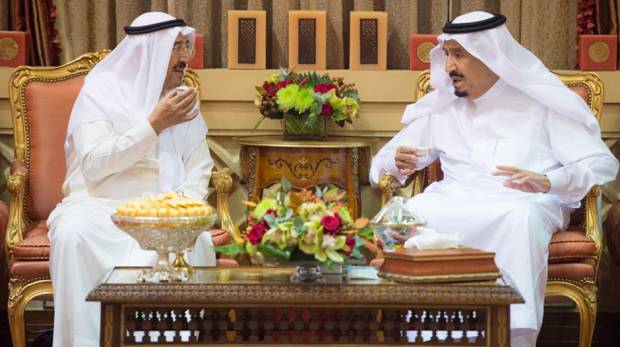Kuwait has reportedly called for postponing the Gulf Cooperation Council (GCC) summit scheduled in December in the northern Arabian Gulf country.
“There is a possibility that the summit be postponed in view of the lack of progress in resolving the Gulf crisis,” Gulf diplomats were quoted as saying by Kuwaiti daily Al Rai on Sunday.
“The postponement will be for six months unless there is a breakthrough following the visit by US Secretary of State Rex Tillerson to Riyadh to attend the inaugural Coordination Council meeting between the governments of Saudi Arabia and Iraq and to Doha.”
However, the sources added that “there are no strong indications for a solution soon.”
In the port city of Jeddah, Saudi daily Okaz cited sources as saying that the GCC summit would be postponed by six months.
“The postponement aims to remove the differences and end the crisis that broke out due to the failure of the Qatari government to abide by the Riyadh 2013 Agreement and its supplementary supplements in 2014, in addition to its involvement in supporting and financing terrorism and supporting the symbols of terrorist group,” the sources that the daily did not identify said.
According to the sources, the postponement was suggested by Kuwait as the host of the next summit.
“Kuwait has not, so far, received responses from the GCC countries,” the sources said.
The GCC, an alliance formed in 1981, comprises Bahrain, Kuwait, Oman, Qatar, Saudi Arabia and the United Arab Emirates (UAE).
On June 5, Bahrain, Saudi Arabia, the UAE and Egypt severed their relations with Qatar accusing it of supporting extremists and funding terrorism.
Kuwait’s Emir Shaikh Sabah Al Ahmad has been mediating between the two sides, but no breakthrough has been achieved so far.
The US has also tried to bring the two sides closer at a discussion table.
Tillerson in July made field trips to Saudi Arabia, Kuwait and Qatar in his bid to bring the parties involved in the standoff to sit together and start a dialogue.
However, he came up short in his attempt to resolve the crisis and at the end of his shuttle diplomacy efforts, he made no announcement of any incremental progress.
“I’m tired, I’m tired, been a long trip,” Tillerson was quoted as telling reporters as he left the Qatari capital Doha, the last leg of his trip.
Three weeks later, Tillerson sent Tim Lenderking, deputy assistant secretary for Arabian Gulf Affairs in the Near East Bureau, and Retired General Anthony Charles Zinni, a retired United States Marine Corps general and a former Commander-in-Chief of the United States Central Command (CENTCOM), to the Arabian Gulf in their other attempt to help defuse the Qatar crisis.
Tillerson is now using his trip to the Gulf to try to liaise between the two sides, but he is facing formidable challenges as the Quartet have clearly indicated that Qatar had first to respond positively to the 13 conditions they set in June days after the dispute broke out.
Speculation in the region has been mounting over whether the GCC annual summit would be held as scheduled, postponed, cancelled or shifted to another venue.
Last week, Kuwait’s Emir Shaikh Sabah Al Ahmad made a one-day fraternal visit to Saudi Arabia where he and King Salman discussed the latest developments in the region.
Then, Kuwait’s foreign minister held talks in Doha with Qatar’s Emir Shaikh Tamim Bin Hamad Al Thani.
No reference to the summit or the meeting was made by the official news agencies of the three countries in their accounts of the visit.








































admin in: How the Muslim Brotherhood betrayed Saudi Arabia?
Great article with insight ...
https://www.viagrapascherfr.com/achat-sildenafil-pfizer-tarif/ in: Cross-region cooperation between anti-terrorism agencies needed
Hello there, just became aware of your blog through Google, and found ...